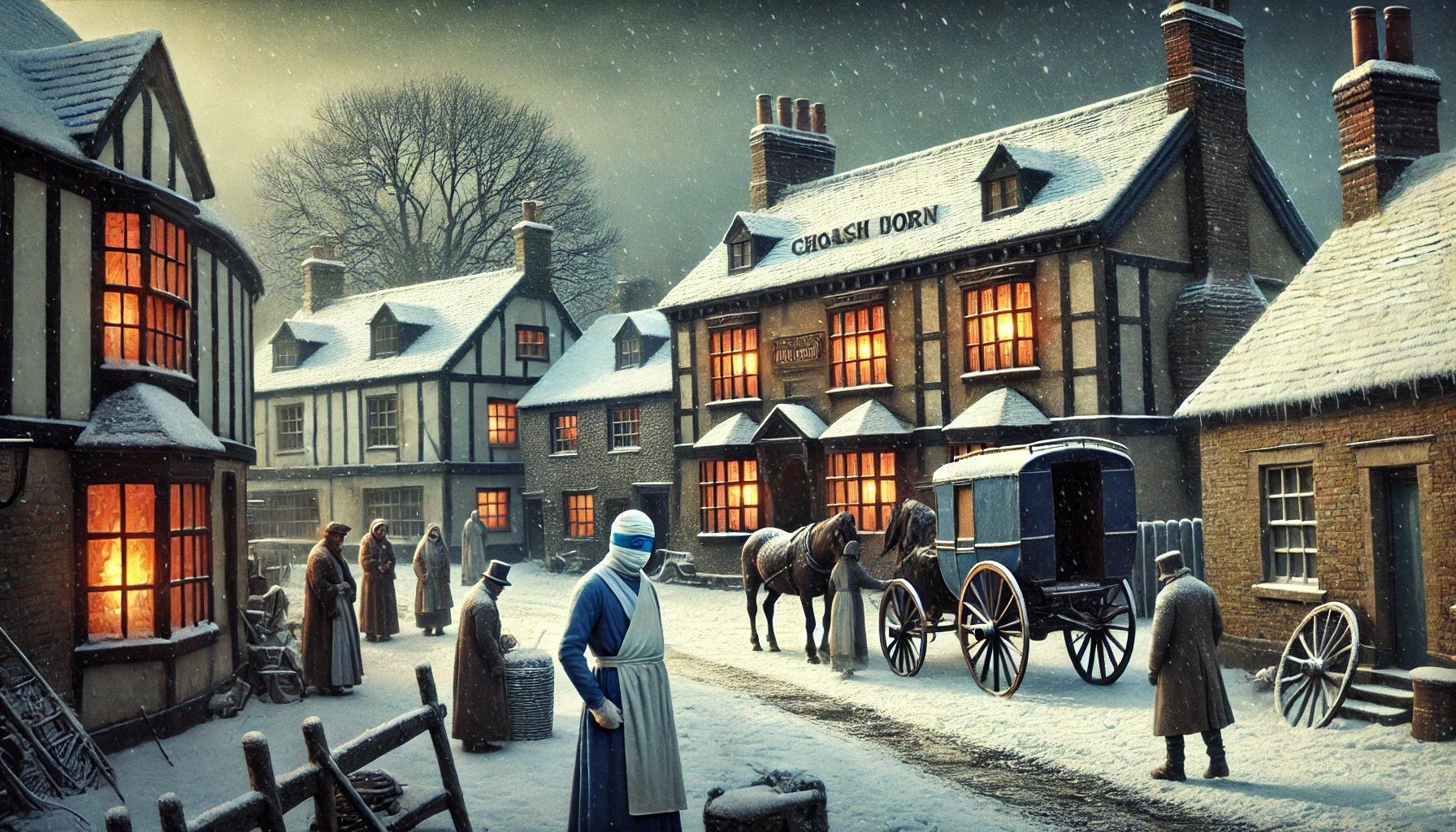“The Haunted Man and the Ghost’s Bargain,” published in 1848, is a supernatural novella by Charles Dickens. It explores the themes of memory, forgiveness, and the human condition. This story is set during the Christmas season, a time Dickens often used to reflect on humanity’s complex emotional landscape. The narrative follows Mr. Redlaw, a chemist haunted by his past, and his encounter with a spectral figure that offers him a unique but dangerous gift.
Plot Summary
Mr. Redlaw, a solitary chemist, is a man shadowed by his past. He dwells in an ancient, dreary part of the city, enveloped in silence and the whispers of his own sorrows. His hollow cheeks and sunken eyes tell of a life spent in constant reflection, a life where joy has long since ceased to visit. He is known among his peers for his brilliance in the field of chemistry, yet those who see him cannot help but notice the darkness that clings to him, as if he is perpetually haunted by unseen phantoms.
One winter’s evening, as Redlaw sits by his fireside, his thoughts lost in the crackling of the flames, a shadowy figure emerges from the gloom of the room. This figure is his exact double, a ghostly doppelgänger, but with a coldness that chills the air around it. The phantom speaks to Redlaw, revealing itself as the embodiment of his own sorrows and grievances, a manifestation of every hurt, betrayal, and loss he has ever endured. It offers him a bargain — the power to forget all his memories of pain and sorrow. In his desperation to rid himself of his torment, Redlaw agrees.
As the ghost’s influence takes hold, a strange transformation occurs. Redlaw’s memories of all past grievances vanish, leaving behind a blank slate where the specters of his past once lurked. He feels an initial sense of liberation, a lightness that he hasn’t known in years. But with this newfound freedom comes an unsettling coldness, a numbness that erases not just the pain but also the warmth of empathy and compassion. He becomes indifferent to the joys and sufferings of those around him, detached from the emotional tapestry that once connected him to humanity.
This dark gift does not end with Redlaw. As he moves through his world, the curse spreads to others, like a contagion of the soul. The first to be affected is his servant, William Swidger. Once a cheerful man, William is transformed into a figure of bitterness and anger, his jovial nature stripped away. The contagion moves on to the rest of the Swidger family, a large, loving brood that now finds themselves cold and unfeeling, as if a dark cloud has settled over their home.
Redlaw wanders further into the town, observing the changes wrought by the ghost’s curse. He encounters the Tetterby family, a poor but tight-knit group struggling to make ends meet. Despite their hardships, they had always been rich in love and warmth. Now, however, they too are altered. The parents are harsh and short-tempered, the children listless and sullen. The spirit of joy that had once filled their small home is now a hollow void.
In his aimless roaming, Redlaw comes across a young student living in a squalid part of the city. The student is sickly and frail, living in near destitution, yet he clings to his studies with a fervor driven by dreams of a better future. Under the specter’s curse, however, the fire in his eyes dims. The memories of his struggles, which once fueled his ambition and hope, are gone. In their place is a void, a lack of purpose that leaves him adrift and empty. It is then that Redlaw begins to comprehend the true horror of the gift he has accepted. The curse of forgetfulness has stripped these people not just of their pain, but of their humanity. In the absence of sorrow, there is no capacity for joy, no understanding of others’ suffering, no connection to the shared experiences that bind people together.
In his despair, Redlaw returns to his home, feeling the weight of his actions pressing down on him. Amid this darkness, he turns to the only person who remains unaffected by the curse — Milly Swidger. Milly, a woman of boundless kindness and compassion, continues to radiate warmth and love despite the hardships she faces. It is her strength and unwavering empathy that provide a glimmer of hope in Redlaw’s darkened world. Milly’s presence in the Swidger household is like a hearth fire in a winter storm, offering comfort and light. She cares for the ailing student with tenderness and watches over her family with a quiet resilience that Redlaw finds both humbling and inspiring. In Milly’s company, he begins to realize that memories, even painful ones, are what give life its depth and meaning. Without them, one is not truly alive but merely existing.
Redlaw, now desperate for redemption, confronts the specter once more. He pleads for the return of his memories, willing to bear the burden of his past if it means restoring the warmth and humanity he has lost. The ghost, unmoved by his remorse, watches him with cold eyes. But it is Milly’s influence that tips the balance. Her compassion, her ability to love and forgive, stands as a silent rebuke to the specter’s cold logic. Through her, Redlaw learns that it is not the absence of sorrow that makes life bearable, but the ability to carry it with grace and to find meaning in the act of living itself.
In the end, the curse is lifted. Redlaw’s memories flood back, bringing with them the sorrows and wrongs he had wished to forget, but also the joy and warmth that come from a life fully lived. The people around him are restored to their former selves, their hearts once again open to the full range of human emotion. The Swidger family returns to its former warmth, the Tetterbys to their noisy but loving ways, and the student to his hopeful aspirations. Redlaw emerges from his ordeal a changed man, not free from pain but reconciled with it, understanding now that to be human is to embrace both light and shadow, joy and sorrow.
In this newfound understanding, Redlaw finds peace. He learns that it is through remembering and sharing our experiences that we connect with others, and it is through this connection that we find the strength to endure and the capacity to forgive. The haunting has ended, but the lessons of the haunted man remain, a testament to the power of memory and the enduring human spirit.
Main Characters
- Mr. Redlaw: A learned chemist haunted by memories of sorrow and wrong. His acceptance of the ghost’s gift leads to a loss of empathy and compassion, but his journey teaches him the value of human experiences, both good and bad.
- The Ghost: A spectral figure resembling Redlaw, it offers him the power to forget his sorrows, setting off the central conflict of the story.
- Milly Swidger: A kind-hearted woman who remains unaffected by the ghost’s curse. Her unwavering compassion and warmth help Redlaw realize the importance of memory in the human experience.
- William Swidger: Redlaw’s servant, who is initially cheerful but becomes embittered under the influence of the ghost’s curse.
- The Student: A poor but ambitious young man who loses his sense of purpose when his memories of hardship are erased.
Theme
- Memory and Identity: The novella explores how memories, even painful ones, are integral to our identity and humanity. Redlaw’s journey reveals that forgetting sorrow does not lead to happiness but rather a loss of self.
- Compassion and Empathy: The story demonstrates the power of compassion, as exemplified by Milly. It is through empathy and understanding of others’ struggles that one can truly connect and find peace.
- The Duality of Human Experience: Dickens shows that joy and sorrow are intertwined. The experiences of suffering and hardship are what make moments of happiness and love so meaningful.
Writing Style and Tone
Dickens employs a dark and gothic tone throughout the novella, creating an atmosphere of mystery and melancholy. His use of vivid and detailed descriptions brings the haunted nature of Redlaw’s world to life. The narrative is rich with symbolism and allegory, particularly in how the ghost represents the haunting nature of unresolved grief. Dickens’ prose is characteristically eloquent and expressive, capturing the emotional depth and complexity of the human experience.
We hope this summary has sparked your interest and would appreciate you following Celsius 233 on social media:
There’s a treasure trove of other fascinating book summaries waiting for you. Check out our collection of stories that inspire, thrill, and provoke thought, just like this one by checking out the Book Shelf or the Library
Remember, while our summaries capture the essence, they can never replace the full experience of reading the book. If this summary intrigued you, consider diving into the complete story – buy the book and immerse yourself in the author’s original work.
If you want to request a book summary, click here.
When Saurabh is not working/watching football/reading books/traveling, you can reach him via Twitter/X, LinkedIn, or Threads
Restart reading!








